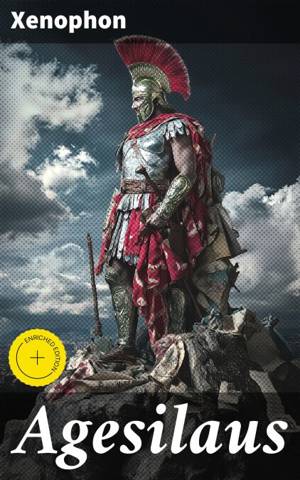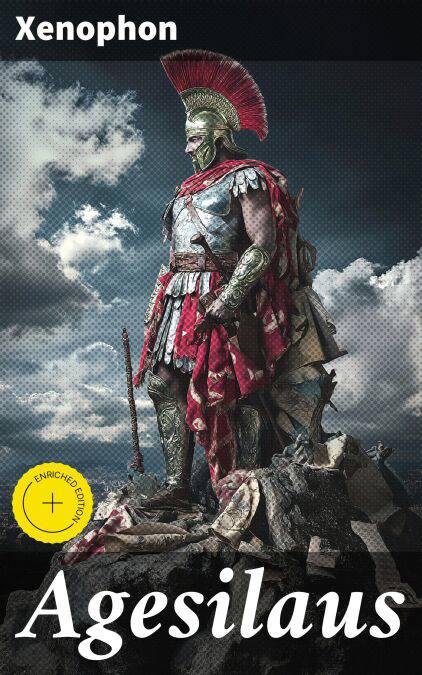
- Afhalen na 1 uur in een winkel met voorraad
- Gratis thuislevering in België vanaf € 30
- Ruim aanbod met 7 miljoen producten
- Afhalen na 1 uur in een winkel met voorraad
- Gratis thuislevering in België vanaf € 30
- Ruim aanbod met 7 miljoen producten
Zoeken
Agesilaus E-BOOK
Enriched edition. The Legendary King of Sparta: Military Campaigns, Political Maneuvers, and Personal Virtues in Ancient Greece
Xenophon
E-book | Engels
€ 1,99
+ 1 punten
Omschrijving
In 'Agesilaus,' Xenophon offers a compelling portrayal of the Spartan king Agesilaus II, weaving together a narrative that balances historical biography with moral philosophy. Written in a concise and elegant style, the text illuminates the complexities of leadership, virtue, and the responsibilities that come with power. Set against the backdrop of the Peloponnesian War and the shifting dynamics of ancient Greek politics, Xenophon's work grapples with the ideals of excellence in governance and the ethical dilemmas faced by rulers, employing a tone that is both reflective and instructive. Xenophon, a student of Socrates and an experienced soldier, drew upon his extensive observations of Greek political life and military strategy to craft this biography. His experiences in the Persian expeditions and the complexities of the Athenian and Spartan conflicts instilled in him a profound understanding of leadership and the personal qualities that define a great ruler. His admiration for Agesilaus highlights his existential belief in the fusion of virtue and power, rooted deeply in the philosophical tradition of his time. For readers interested in political theory, ethics, and isomorphic explorations of leadership, 'Agesilaus' is an essential read. It not only provides insight into one of Sparta's most illustrious leaders but also serves as a timeless reflection on the character and responsibilities of those who wield power. This text is indispensable for scholars and enthusiasts of ancient history, as well as anyone contemplating the nuances of effective leadership.
In this enriched edition, we have carefully created added value for your reading experience:
- A succinct Introduction situates the work's timeless appeal and themes.
- The Synopsis outlines the central plot, highlighting key developments without spoiling critical twists.
- A detailed Historical Context immerses you in the era's events and influences that shaped the writing.
- An Author Biography reveals milestones in the author's life, illuminating the personal insights behind the text.
- A thorough Analysis dissects symbols, motifs, and character arcs to unearth underlying meanings.
- Reflection questions prompt you to engage personally with the work's messages, connecting them to modern life.
- Hand‐picked Memorable Quotes shine a spotlight on moments of literary brilliance.
- Interactive footnotes clarify unusual references, historical allusions, and archaic phrases for an effortless, more informed read.
In this enriched edition, we have carefully created added value for your reading experience:
- A succinct Introduction situates the work's timeless appeal and themes.
- The Synopsis outlines the central plot, highlighting key developments without spoiling critical twists.
- A detailed Historical Context immerses you in the era's events and influences that shaped the writing.
- An Author Biography reveals milestones in the author's life, illuminating the personal insights behind the text.
- A thorough Analysis dissects symbols, motifs, and character arcs to unearth underlying meanings.
- Reflection questions prompt you to engage personally with the work's messages, connecting them to modern life.
- Hand‐picked Memorable Quotes shine a spotlight on moments of literary brilliance.
- Interactive footnotes clarify unusual references, historical allusions, and archaic phrases for an effortless, more informed read.
Specificaties
Betrokkenen
- Auteur(s):
- Vertaler(s):
- Uitgeverij:
Inhoud
- Aantal bladzijden:
- 130
- Taal:
- Engels
Eigenschappen
- Productcode (EAN):
- 4057664644930
- Verschijningsdatum:
- 24/11/2019
- Uitvoering:
- E-book
- Beveiligd met:
- Digital watermarking
- Formaat:
- ePub

Alleen bij Standaard Boekhandel
+ 1 punten op je klantenkaart van Standaard Boekhandel
Beoordelingen
We publiceren alleen reviews die voldoen aan de voorwaarden voor reviews. Bekijk onze voorwaarden voor reviews.








